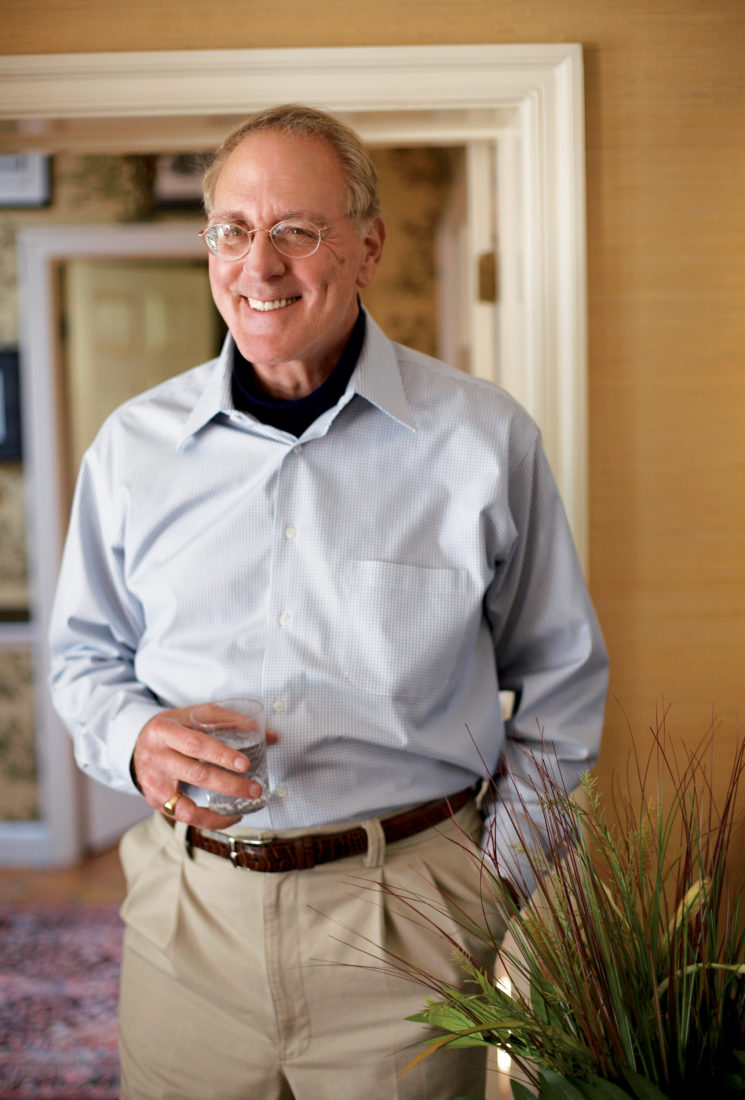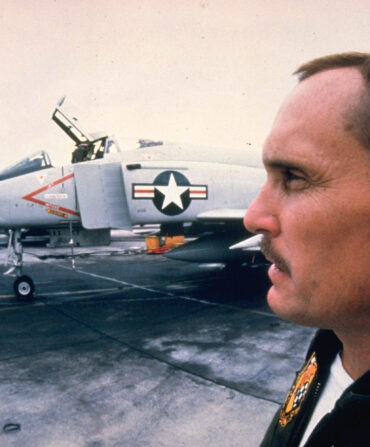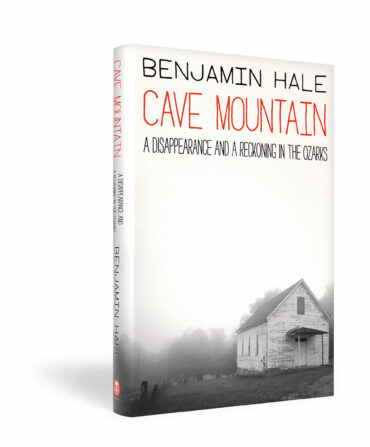The objects in Winston Groom’s study in the elegant Point Clear home he shares with his wife, Anne-Clinton, and their eight-year-old daughter, Carolina, provide insight into the work and sensibilities of the author of Forrest Gump and thirteen other books of fiction, memoirs, and narrative history.
On the table is a six hundred-page manuscript for a novel, El Paso, about Pancho Villa and the Mexican Revolution, which Winston’s been working on for ten years. Across the computer screen unfolds the text for a history that he’s on schedule to complete this summer — a narrative of the Battle of Vicksburg together with his argument “that the war should have ended there.”
On the fireplace hangs the cavalry saber that belonged to his great-grandfather Fremont Thrower, who rode with Gen. Joseph “Fighting Joe” Wheeler. Thrower provided Winston with a personal connection to his Civil War history, Shrouds of Glory. The sword, Winston speculates, also likely belonged to his great-great-great grandfather, Elijah Montgomery, a major in the War of 1812. Winston wrote eloquently of Major Montgomery in his most recent book, Patriotic Fire: Andrew Jackson and Jean Laffite at the Battle of New Orleans.
While his military histories — his focus in recent years — are epic narratives, he often finds a way into them through his family’s past. As he explained in the opening of his World War II book 1942, “I was not born into a family of warriors, although practically every generation of it has served in one American war or another, from the War of Independence and the War of 1812, to the Creek Indian wars and the Civil War, to the Spanish-American War and the First World War.”
Over his desk is a Forrest Gump movie poster — Forrest sitting on a bench — autographed by cast members. “Dear Mister Groom,” reads one inscription, “I can only thank you and hope you’ll forgive my irregularities in this Forrest. Very respectfully, Tom Hanks.” “Mr. Groom,” reads another, “thanks so much for Mama Gump!! Yours forever, Sally Field.”
Then there are the cabinets filled with countless research books that Winston pores over for his histories. After publishing thousands of pages, he is an author who’s still intent on mastering new topics.
Even more than the hunt, he says “I enjoy the après-hunt. It’s about the camaraderie.”
And, leaning against the cabinets are the guns. Shotguns, he specifies.
Although, like Winston, I grew up in Mobile, went to the same high school, and also had a distinguished lawyer dad, I never toted a gun of any kind through woods or field. So I look to Winston, whose father raised him hunting, to tell me about the seven double-barreled shotguns leaning against his library shelves.
As he lifts each and sights down the barrel, then handing it to me, he explains they are all bird guns, though each has a different use — waterfowl, quail, pheasant, or skeet. “I’m not a collector, but I do like fine guns,” he says, “especially old ones, since the craftsmanship was so much better then.” Then he recounts their stories.
One is a 28-gauge Arietta, a Spanish gun made in the 1960s that he won in a lottery at his sporting clays club in Cashiers, North Carolina, where he and his family spend the hottest part of each summer in their cool mountain retreat. Another is a 12-gauge Guyot, a 1910 French gun that he got from a man who’d been in the American embassy in India and claimed it had belonged to the Maharaja of Jodhpur.
Then there is the 20-gauge L.C. Smith, a Crown Grade American sidelock built in 1926, with engravings of dog and quail scenes on the locks and extra fine checkering on the black walnut stock. His newest, an Italian Beretta 20-gauge, a versatile gun fashioned to make left-handed shooting easier, was acquired for Winston by the president of Beretta after he lost sight in his right eye. “He took pity on me,” Winston says.
In a long row above the sofa are the framed dust jackets of his books. His mother-in-law, Wren, who doubles as his researcher, made the display starting with his first novel, Better Times Than These, which he wrote after serving in Vietnam as a lieutenant with the Army’s 4th Infantry Division. During the war, while in combat, Winston took notes; when he returned stateside and took out his notebooks, they still had dirt, clay, and bits of blood on them. He says they helped jog his memory for the novel, which was inspired by James Jones’ The Thin Red Line. Jones became his mentor and, soon, his close friend. While living in East Hampton, Long Island, and also in New York City, Winston also became friends with, among other luminaries, Willie Morris, Joseph Heller, and Peter Matthiessen. “They showed me many kindnesses,” he says.
I ask Winston if, after the violence of combat, he found it difficult, or even absurd, to wield a gun for sport. No, he says. He didn’t go hunting until two years after returning from Vietnam, and one of his first forays was duck hunting in the Mobile River Delta. As he recounts the pleasures of that hunt, and others, seeking out duck, quail, and dove (he has just returned from a turkey hunt in piney South Alabama, though he jokes, “I generally don’t like to hunt anything that gets up earlier than I do”), he talks of the delight of being in the woods, marsh, or open fields. He decries real estate development despoiling rivers and paving over fields, selling out nature’s beauty for the quick buck.
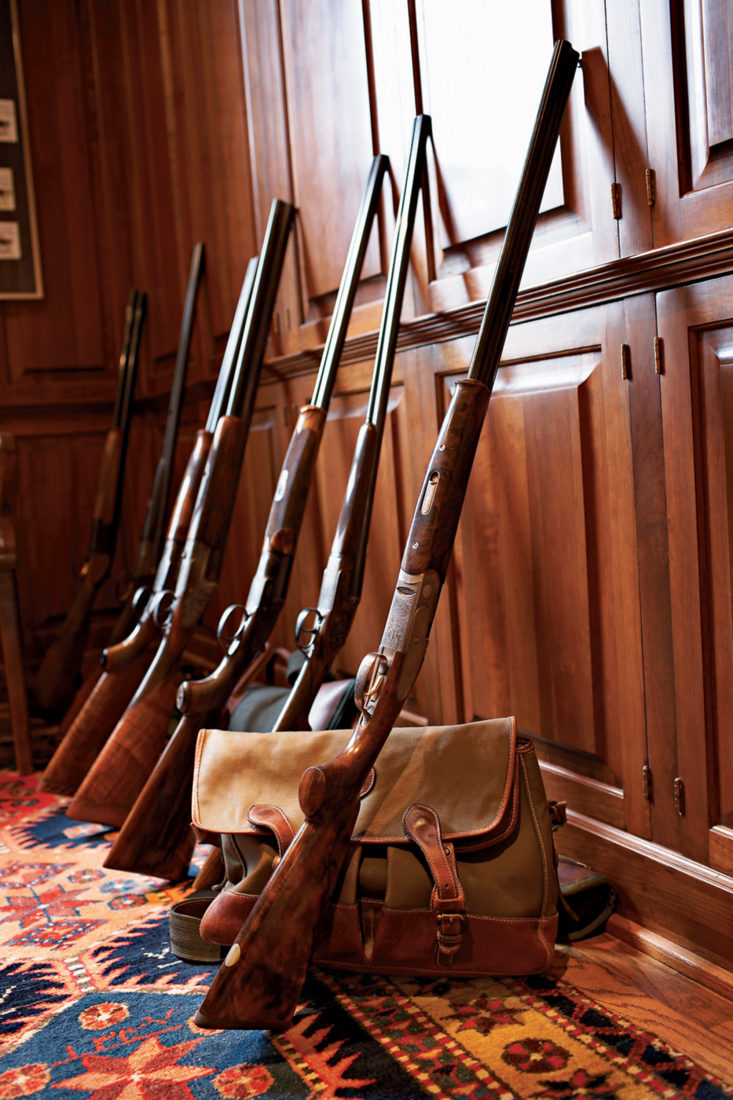
Photo: Squire Fox
A row of bird guns lines the wall of Groom’s study.
But even more than the hunt, he says, “I enjoy the après-hunt. It’s about the camaraderie.” Besides, he adds, “hunters are great liars.” At a hunting camp, storytelling becomes the stock-in-trade, and telling stories, is, after all, what Winston likes to
do best.
The night is rainy, and as Winston and I head to his car to go out to dinner, we walk through his beautiful, spacious home — “the house that Gump built,” he says, acknowledging how the novel and movie turned him from a hard-working, well-regarded author into a hard-working, well-regarded, and well-compensated one.
On the carport wall in front of Winston’s car is a hand-written sign that says, “Reserved Winston Groom (wrote some book). Will work for gumbo.” Winston tells me it once designated his parking spot at the blessing of the shrimp boat fleet at Bayou La Batre, on the Alabama coast, across the bay from Point Clear. Several years ago he was grand marshal of the event in recognition of Bayou La Batre being, in Forrest Gump, the place where Bubba Gump Shrimp came into being, and afterward they gave him the sign.
Winston is lanky, with a somewhat formal bearing and flashes of dry wit. If you ask how tall he is, he says, “Five feet seventeen inches. Don’t count on your fingers.”
At the University of Alabama, where he had enrolled in ROTC knowing that the Vietnam draft was on, he was editor of the college humor magazine. He began his career, though, writing serious, dramatic novels, not only about Vietnam but also about the tangle of race relations, money, and old families in the Deep South, such as As Summers Die, which became a television movie with Scott Glenn, Jamie Lee Curtis, and Bette Davis. But the rollicking humor of Gump was waiting to surface, and the chance came.
His dad, Winston Groom, Sr., sowed the seed for Gump when he told him a story about a mentally disabled boy in Mobile who was teased by other children, but who, as Winston recalls, learned to play the piano in three days. “Gorgeous music,” he says. The character got his name by serendipity, when Winston, just home from Vietnam in 1967, was on the West Coast, amidst the rising clamor against the war. He quickly discovered that walking into a San Francisco bar in his Army uniform was not a good way to meet girls, so he went out and bought a civilian suit at a big department store called Gumps, at the time the city’s largest. The curious name stuck with him through the years, and found its soul in Forrest.
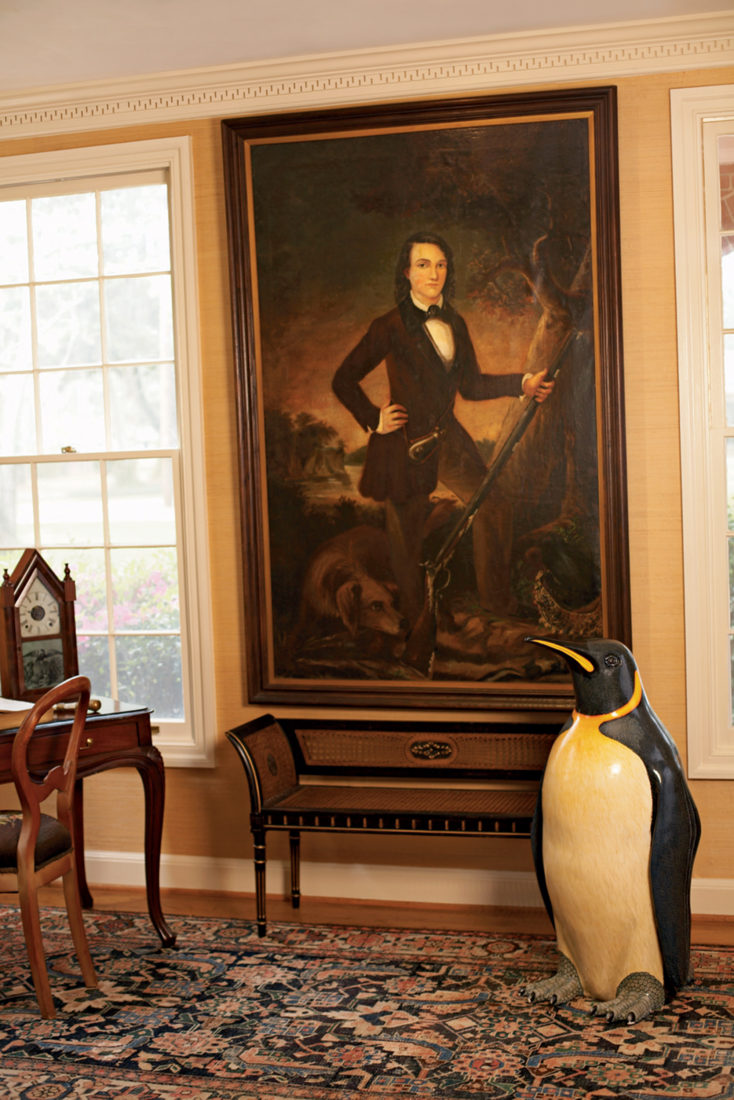
Photo: Squire Fox
Oil portrait of Groom’s great-great uncle, Thomas Barnes Thrower (c. 1857), who died of yellow fever. “He’d likely got himself killed in the Civil War anyway,” Groom says stoically. The Antarctic King Penguin (foreground) is a family pet.
Like Winston, Gump, too, would go to Vietnam, though Winston has written overtly about the war only on a few occasions, including his nonfiction book Conversations With the Enemy. Still, Winston admits, in terms of his understanding of warfare and how humans hold up under fear and pressure, there is a little bit of Vietnam in much of his work.
We arrive at Lakewood Restaurant, across from the Grand Hotel’s Robert Trent Jones Trail golf course. I order a vodka tonic, but Winston asks for a Virgin Mary, telling me that he’s cut back to an occasional beer. We talk about the tradition of writers and heavy booze — and writers destroyed by it. Although he has enjoyed his share of hard partying, at sixty-four and with a young child — his first — he has different goals. These days he enjoys working out at the health club, playing tennis with his daughter, and staying in shape. Too often, he laments, he picks up the Mobile Press-Register or the New York Times to find the obituary of a friend. He is determined to stay healthy.
And to maintain what he calls “the same level of writing.” He continues to find a source of inspiration in the early models of his parents. His mother, Ruth Knudsen Groom, a high school teacher with a master’s thesis on Shakespeare, died while Winston had his first job as a reporter at the former Washington Star. Looking back on it now, he says, her passing became a linchpin in his decision to leave the job and write his first book. How would she feel about his accomplishments now?
“I’m not a big church-goer,” he says, “but I think she’s seeing it.”
Now this son of a teacher, a man who has spent much of his life educating himself on new topics — the structure of a novel, the history of America at war, how to shoot a shotgun left-handed — feels the responsibility to be a conscientious teacher to one beloved pupil of his own. At an age at which many men have young grandchildren, Winston is concerned about ensuring that his grammar-school-age daughter doesn’t grow up any faster than she has to.
“But we don’t want to hold her back either,” he says.
Although many of Carolina’s classmates have seen the movie Forrest Gump, Winston has kept her from seeing it. He has worried about some of its violence and language. But she is curious.
This summer, he figures, will be the time for the two of them to sit down together and watch it.


